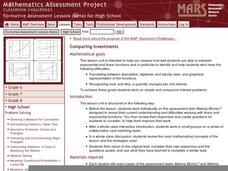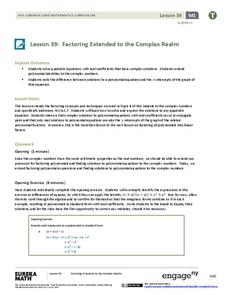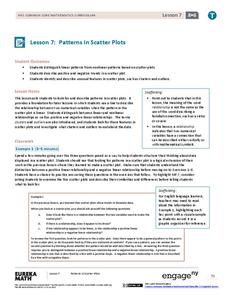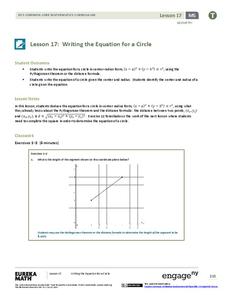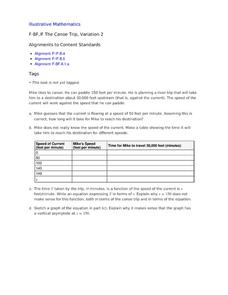Curated OER
Logarithmic Forms
There are 10 different problems related to particular logarithmic forms for learners to solve. They express each exponential form equation given in logarithmic form and write out the opposite of each form as illustrated.
Curated OER
Trigonometric Functions
Here is a worksheet that includes three short trigonometry problems. Learners must use trigonometric definitions and identities to solve. Use this resource to review trigonometry, or as an assessment.
Curated OER
Mathemafish Population
It's shark week! In this problem, young mathematically minded marine biologists need to study the fish population by analyzing data over time. The emphasis is on understanding the average rate of change of the population and drawing...
Curated OER
Exploring Functions with Calculus and Dynamic Software
Calculus can be project-based and inquiry-centered by using dynamic software.
Curated OER
Soduko
In this calculus worksheet, student solve problems by taking the derivative of the function as x approaches a specific limit. They evaluate trig functions using the properties of trig. There are 26 questions with an answer key.
Curated OER
Infestation to Extermination
Students solve problems with exponential growth and decay. In this calculus activity, students relate exponential functions to infestation and extermination. They take the derivative to find their answer.
Concord Consortium
Broken Spreadsheet II
Work in reverse with the product becoming the given. Using a spreadsheet image of the graph of a trigonometric function, young scholars investigate methods of creating spreadsheet data that results in the given graph. The catch? The data...
West Contra Costa Unified School District
Interest and the Number e
Mary, Mary, quite continuously, how does your money grow? Uses examples to examine the difference between simple interest and compound interest, and to take a look at different rates of compounding. Learners explore what would happen as...
Curated OER
More Differentiation
In this differentiation worksheet, students solve and complete 8 various types of problems. First, they differentiate each of the equations listed. Then, students find an equation of the tangent to the curve at a given point. They also...
Texas Instruments
Confectionery Delight
High schoolers explore the problem of maximizing the volume of a box by making a physical model and observing how changes in the orientation of the paper changes the volume. They use the symbolic capacity of their calculators and...
Curated OER
River Optimization Problem
Young scholars define the different methods used for optimizing a particular element of a problem. In this optimization problem activity, students optimize appropriate details of a problem using data collection, algebra, technology,...
Curated OER
Worksheet 3: Graphing Speed and Time
In this graphing speed and time worksheet, students answer 7 questions regarding graphing, speed, distance, derivatives, Newton's method and wheel radius.
EngageNY
Bean Counting
Why do I have to do bean counting if I'm not going to become an accountant? The 24th installment of a 35-part module has the class conducting experiments using beans to collect data. Learners use exponential functions to model this...
EngageNY
Geometric Sequences and Exponential Growth and Decay
Connect geometric sequences to exponential functions. The 26th installment of a 35-part module has scholars model situations using geometric sequences. Writing recursive and explicit formulas allow scholars to solve problems in context.
Mathematics Assessment Project
Representing Polynomials
Use this complete and very detailed lesson plan to assess your students' understanding of two important behaviors of polynomials. The first is the relationship between the zeros of a polynomial function and the function's graph, and the...
Curated OER
Comparing Investments
Money, money, money. A complete lesson that makes use of different representations of simple and compound interest, including written scenarios, tables, graphs, and equations to highlight similarities and differences between linear and...
EngageNY
Percent Rate of Change
If mathematicians know the secret to compound interest, why aren't more of them rich? Young mathematicians explore compound interest with exponential functions in the twenty-seventh installment of a 35-part module. They calculate future...
Chapman University
Proof of L’Hospital’s Rule
Understanding how calculus formulas were derived connects learners to the idea that the study of mathematics is continuous and cumulative. Learners will also develop a deeper appreciation for the derivative's application in simplifying...
EngageNY
Are All Parabolas Similar?
Congruence and similarity apply to functions as well as polygons. Learners examine the effects of transformations on the shape of parabolas. They determine the transformation(s) that produce similar and congruent functions.
EngageNY
Factoring Extended to the Complex Realm
A solution will work one way or another: find solutions, or use solutions to find the function. Learners use polynomial identities to factor polynomials with complex solutions. They then use solutions and the Zero Product Property to...
EngageNY
Patterns in Scatter Plots
Class members investigate relationships between two variables in the seventh installment of a 16-part module that teaches scholars how to find and describe patterns in scatter plots. Young mathematicians consider linear/nonlinear...
EngageNY
Writing the Equation for a Circle
Circles aren't functions, so how is it possible to write the equation for a circle? Pupils first develop the equation of a circle through application of the Pythagorean Theorem. The lesson then provides an exercise set for learners to...
EngageNY
Analyzing Residuals (Part 2)
Learn about patterns in residual plots with an informative math lesson. Two examples make connections between the appearance of a residual plot and whether a linear model is the best model apparent. The problem set and exit ticket...
Curated OER
The Canoe Trip, Variation 2
The behavior of a rational function near a vertical asymptote is the focus around this trip up a river. Specifically, numerical and graphical understanding is studied. The canoe context pushes the variables as numbers, rather than as...

















